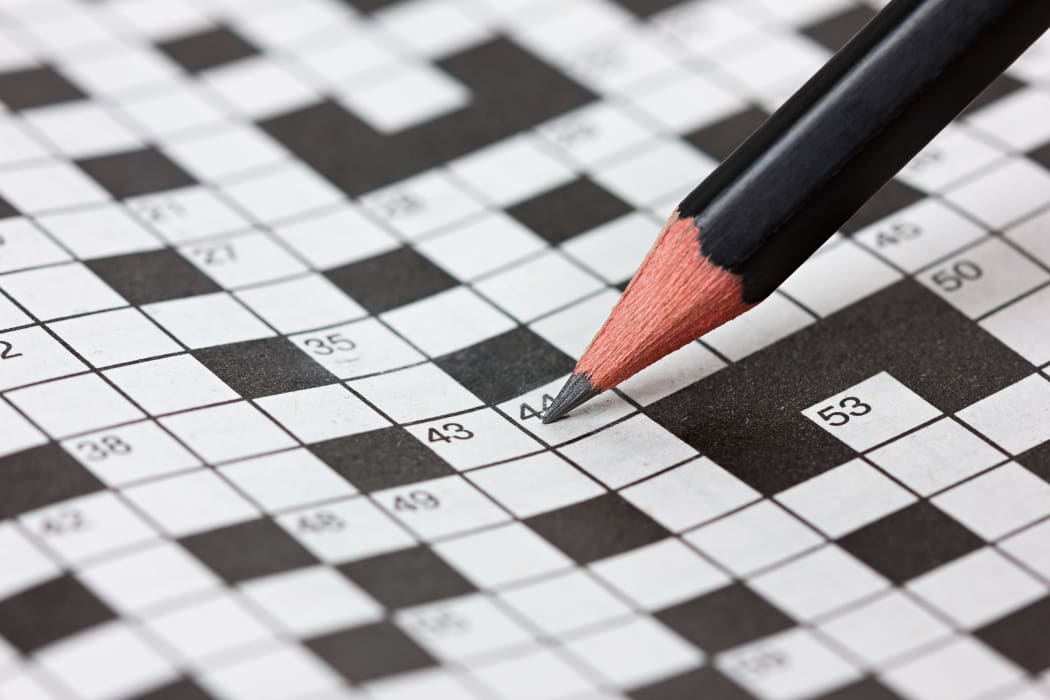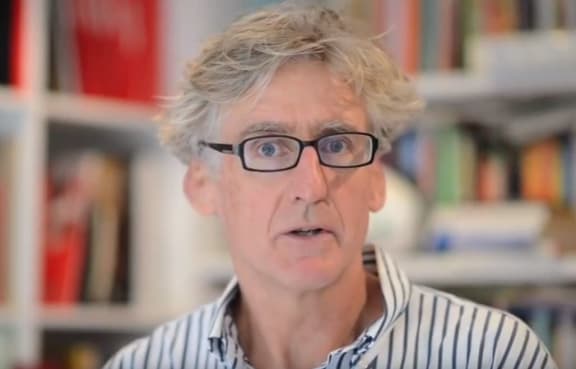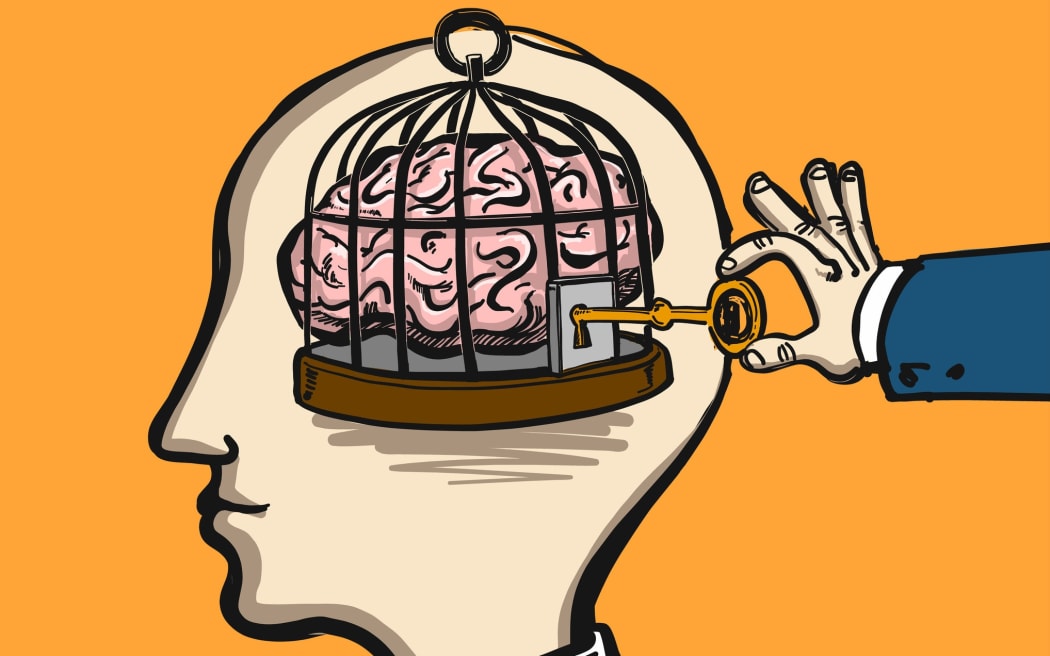Crossword puzzles are a workout for the brain using both creativity and logic - and we're only just learning the mechanics of how they help maintain mental fitness into old age, puzzle designer David Astle says.

Photo: 123RF
Astle, a Melbourne-based writer and a full-on word nerd - something of a dictionary expert - is a legend in Australian crossword circles, knocking out a notoriously tough weekly cryptic crossword for The Age and The Sydney Morning Herald.
His latest book, Rewording The Brain explains how the mind responds to tackling word puzzles and the benefit that can bring, including increasing brainpower and cognitive capacity.
He's recently taken part in an fMRI study - the first of its kind exploring activity in different sections of the brain while solving 300 crossword puzzles.

Australian crossword designer David Astle. Photo: Fair Use / YouTube
"It’s only in the past few years that we’ve looked fairly and squarely into the lives of the brain - into the neurotransmitters to actually see what the traffic and the fireworks are telling us," he says.
"They were ecstatic when they saw these patterns because they were patterns that they hadn’t typically seen in other MRI scans.
"The actual hardware and nuts and bolts of it were fascinating - it all required a computer screen behind the MRI tube itself about 3m away so it didn’t interfere with the magnetics.
"I had like an oblong mirror on my nose that acted like a periscope - like a rear-view mirror … so I could see [the screen] behind me.
"These clues would just cascade along the screen and I had nine seconds to solve each one.
He says the results of that study a couple of weeks ago are still being worked on.
"It will take quite a bit to mine and to collate, because bear in mind 300 clues at various formulas - wordplay formulas, various timings in terms of when eureka happened or when bewilderment happened - there’s a whole lot of variations and permutations."
He has some suspicions about what they it will show, however.
"What cryptic crosswords in particular and puzzles in general help us do is think in different ways. So much of the challenges that we face in life we often tackle in the same default thinking mode that we may have.
"It’s called a focal fixedness ... but if we’re doing more and more of these sorts of puzzles like cryptic crosswords that dish up anagrams and homophones and puns, you can’t afford to think like that.
"What puzzles encourage us to do is to think in both a logical way and in a creative and intuitive way. If you can think in both those spheres, and have those two modes interconnect so that there is this constant crossover between the two, it creates a lot more agile and adaptive ways of not just solving problems but also living your life.
"Puzzle play rewards both those modes of thinking. You can’t have one without the other and too often when we go through life we either rely purely on intuition or purely on logic.

(file photo) Photo: 123RF
"Puzzles, amongst other pursuits, remind us that we need to have the two in concert to have a fully functional version of the mind."
He also thinks the more difficult a puzzle, the bigger the payoff.
"If you solve a knock-knock joke there’s not real pleasure in it, but if the riddle takes a fair bit of thinking until you come up with that right answer I do believe there would be quite a bit of traffic and joy going on in your head.
"The endorphins spike and the cortisol and the adrenaline drops - so there is this real general and genuine wave of pleasure."
He says another important aspect is solving puzzles helps build resilience and resistance to dementia. He said the Exeter study looked at thousands of people and found those who were both social and solved crossword puzzles were more likely to have minimal cognitive decline after age 70.
Designing cryptic crosswords
Astle says he has an "old school" method for designing his crosswords.
"I do have a whole stack of old graph books - like the sort of thing we used to have for trigonometry, and I just rule those up: I create 15x15 open squares.
"Then I sit down with a pencil and an eraser and I put in a word like ‘winebar’ - because it’s an anagram of webinar which is the new craze these days.
"Or I put in a word like bristle - because it makes me think of a funny clue, like bristle can be both hair and to be angered.
"So I put in words that have anagram potential, double meaning potential, homophone potential."
"The important part of interlocking the words is that whatever you do in one corner you need to do in the opposite corner in terms of the length and orientation of the word.
"And then it’s a case of daydreaming up the clues - that can take anywhere from a few hours up to a few weeks depending on how much you want to mull and meditate over finding the perfect deception."
The trickiest puzzle
He says polyphony is, in his experience, the most difficult type of puzzle to solve.
"If you think of a word like 'steeper' - which is not always referring to the gradient on a hill, but actually could be a teabag because that’s something that steeps in hot water.
"It’s called transgressive grammar, which is the fancy term - it’s basically letting go of all those school day lessons and those school day rigmarole and just looking at words in a much more open way.
"Flower … you suddenly realise that ‘flower’ could be referring to a river, not a blossom. And if you can’t make that little jump, if you can’t look at the alternative identity of a word, then a lot of people get very frustrated by that."
Tips for solving cryptic crosswords
He says there's a reason 'cheating' is an anagram of 'teaching'.
"I do believe if you look at the answer to a cryptic clue and you’re just starting and you just want to know how they work, find the answer then look back at the clue.
"If you could see possibly how … a word like 'screen' is clued by 'blind test' - you think hang on, it’s a double meaning, because screen is like a blind, and it’s also a test.
"So that’s kind of a double meaning clue - that kind of working back from the answer to the clue will give you those penny-drop moments to help you to decipher the formulas involved.
"Hopefully your brain will be flexing and jumping and somersaulting thinking ‘this is fun, I didn’t realise this playground was available’.
The future of crossword puzzlers
Despite the stereotype of retirees sitting and doing crosswords at home, Astle says the newer generations are getting into them just as much - if not more.
"I think more and more people are communicating by a written language - because it’s social media, it’s texting, it’s SMS, it’s tweets - there’s so much more language, slang, discourse being written that we are really playing with spelling, playing with meanings, playing with different phrases.

(file photo) Photo: 123RF
"There’s been a study to suggest that one of the most popular professions when it comes to solving crosswords is the coding generation. These are people who have to work with permutations and with sequences, but also have to come up with problems and different ways of thinking."
"All that is to suggest that the next generation … there’s so much adoration and I get so much correspondence from people at uni, people at school, who love their cryptic hit."

